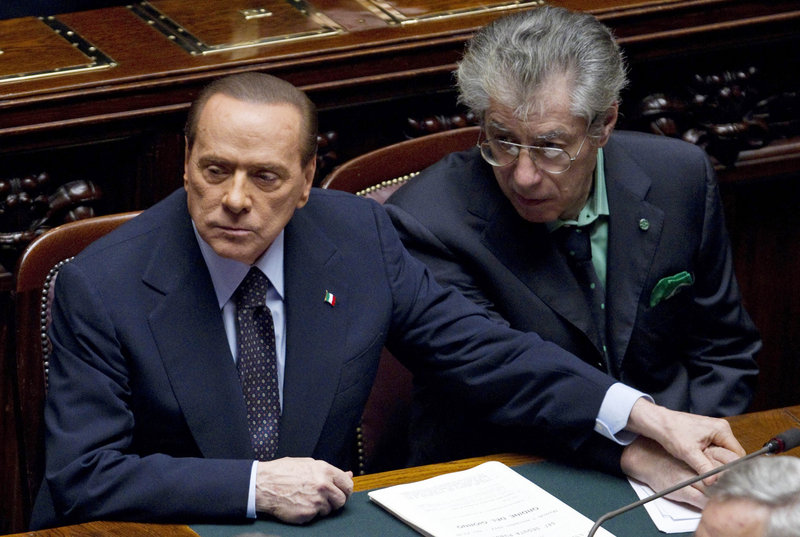ROME — Italy’s president moved swiftly Wednesday to reassure anxious markets, promising that Silvio Berlusconi would soon be vacating the premier’s office and unexpectedly lavishing praise on economist Mario Monti, who might lead the debt-plagued country’s next government.
The former European competition commissioner is widely considered to be a top contender to be the next Italian premier, now that Berlusconi has pledged to resign as soon as urgently demanded economic reforms are approved by Parliament.
President Giorgio Napolitano’s office announced he had named Monti, who now runs the prestigious Bocconi University in Milan, as a senator-for-life. Senators-for-life include notable figures outside of politics and have voting privileges in the Senate. The honor could reinforce Monti’s widely viewed status as a respectable figure who is above party politics.
Earlier in the day, financial markets had pounded Italy as investors worried that Berlusconi might linger in office. Napolitano had responded by declaring there was no doubt that Berlusconi would leave soon, appearing to soothe investors.
Wednesday night, State TV said the financial reform measures so eagerly sought by Italy’s eurozone partners might be approved by Saturday.
It was another chaotic day driven by the European debt crisis. The Dow Jones industrial average dropped nearly 240 points in New York morning trading after Italy’s borrowing costs soared to a record high. Traders were troubled by signs that Europe’s unending debt crisis was enveloping Italy, the eurozone’s third-largest economy and a nation too big for Europe to bail out.
Across the Ionian Sea, Greek lawmakers labored for a third day but finally came up with a deal to create an interim government to pass the country’s new debt deal. Outgoing Greek Prime Minister George Papandreou, who was expected to formally resign soon, wished the next prime minister well but gave no indication of who it would be.
Greek opposition members claimed the ruling Socialists were holding up the naming of the interim Greek leader.
Berlusconi had pledged to resign after the Italian parliament passes the financial reforms that European officials have been demanding for months. The process can take up to two weeks, but Napolitano said that would be accelerated to days, allowing him to quickly begin talks on forming a new government or calling new elections.
“Fears are totally unfounded that Italy may experience a long period of inactivity,” Napolitano said, adding that “emergency measures” could be adopted at any time.
Italian Senate President Renato Schifani told reporters he was expecting approval of the economic measures by the end of this week.
“The moment we’re going through, with international speculation attacking our country, requires swift choices and political cohesion,” Schifani said.
Italy’s key borrowing rate spiked to a high of 7.40 percent on Wednesday, up 0.82 percentage points from the previous day, as markets expressed concern about how swift and complete Italy’s political transition would be. That’s over the level that eventually forced other eurozone countries like Greece and Portugal to seek bailouts.
The rate settled down to 7.26 percent after Napolitano’s remarks.
“Berlusconi is the supreme political maneuverer. And no one will believe he has resigned until, yes, he has done so. Simple as that,” said Jan Randolph, head of sovereign risk analysis at IHS Global Insight.
No one is suggesting that Italy is headed for an immediate bailout. Randolph said it will take a while for the higher borrowing rate to cause problems for Italy’s “mountain of debt.”
“With a catastrophic scenario — and it seems we are facing now a catastrophic scenario — maybe Berlusconi can be pushed to support a new government. Or maybe his party will crumble,” said Roberto D’Alimonte, a political analyst at Rome’s LUISS University.
Noted economist Nouriel Roubini, who has lived in Italy, expressed a similar view on Twitter: “Yields at 7%: Markets are telling Berlusconi to leave NOW. They don’t buy his scheme of pretending to leave in 2 weeks after budget is passed.”
D’Alimonte said investors are hoping for a technocratic government led by Monti. Berlusconi and his allies claim such a solution would be undemocratic, however, because the conservatives won the last election.
With debts of around $2.6 trillion, Italy is considered too big for Europe to bail out. Higher borrowing rates will make it more difficult and expensive for Italy to roll over its debts. It has more than $412 billion to raise in 2012 alone.
Send questions/comments to the editors.



Success. Please wait for the page to reload. If the page does not reload within 5 seconds, please refresh the page.
Enter your email and password to access comments.
Hi, to comment on stories you must . This profile is in addition to your subscription and website login.
Already have a commenting profile? .
Invalid username/password.
Please check your email to confirm and complete your registration.
Only subscribers are eligible to post comments. Please subscribe or login first for digital access. Here’s why.
Use the form below to reset your password. When you've submitted your account email, we will send an email with a reset code.